The Round Hill Society
The home site of the Round Hill Society, a community group of the residents of Round Hill in Brighton, England. The site contains information about the area, latest news and reflections on life in Round Hill.
Notes from a wildlife garden
by Jan Curry Round Hill Reporter" December 2003
I keep being asked, '’what makes an award winning wildlife garden?” especially as this one looks, at first glance, like most other gardens do.
Well, firstly we have tried to make it look pretty and inviting for humans as well as creatures and why not, it is after all a garden, not a nature reserve. So not all the plants are native but many of those that are not, are rich in nectar, berries or prickles.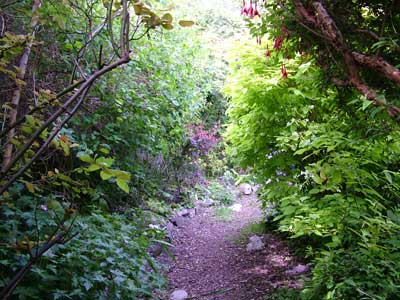
We have not used chemicals or pesticides for years. In the distant past I use to chuck slug tablets round like confetti until I realised that the hedgehogs, birds and amphibians that ate dying slugs were also being slowly and painfully poisoned.
Compost heaps are a must. I still get a buzz digging out beautiful compost each Spring, the product of six months’ garden and kitchen waste - it's magic!
The compost heap is also home for slow worms and toads, so I have to take care.
There are numerous ponds, some in full sun, some in part shade. They are home to frogs and newts, dragon and damsel flies and strange underwater creatures I can't name and often wonder how they came to get there, particularly as this is a city garden surrounded by high walls.
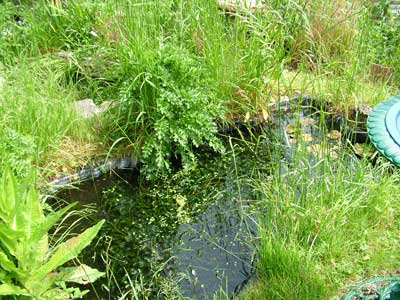
Piles of mossy rocks and logs provide hiding places and homes for beetles and Red Mason bees. Hollow branches are used by over-wintering ladybirds and hoverflies; spiders weave intricate webs all over the place. Many moths and butterflies die as soon as it becomes cold but the few that hibernate can be found in corners of the shed.
Winter visitors are now joining the resident birds - there are lots of nest boxes in the garden, eight were successfully occupied this year.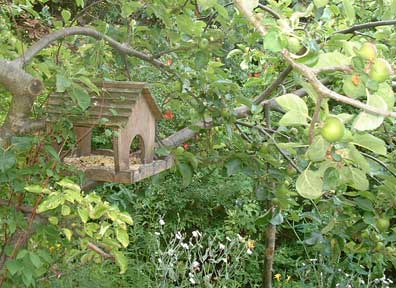
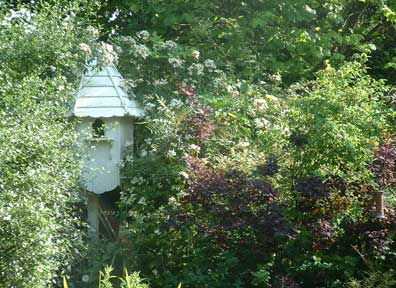
It is easy to count fifteen different types of bird at any one time in the garden and we have also seen a jay, a woodpecker and a kestrel here this summer. There are numerous 'feeding stations'; some are well hidden in the shrubs so that smaller birds get a chance to feed away from the hustle bustle of the main bird table.
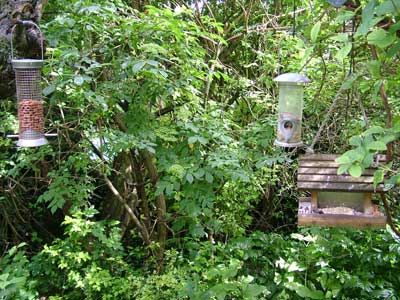
A squirrel has built its dray in the elm tree and a fox drops by regularly - I could do without both of them as the squirrel gobbles up the bird food and the fox takes my free range hens but I guess the point of a wildlife garden is that you can't pick and choose.
Winter now, and the whole garden will be allowed to die back naturally, covered by a blanket of leaves. It will soon be Spring!
This page was last updated by Ted on 20-Nov-2013I keep being asked, '’what makes an award winning wildlife garden?” especially as this one looks, at first glance, like most other gardens do.
Well, firstly we have tried to make it look pretty and inviting for humans as well as creatures and why not, it is after all a garden, not a nature reserve. So not all the plants are native but many of those that are not, are rich in nectar, berries or prickles.

We have not used chemicals or pesticides for years. In the distant past I use to chuck slug tablets round like confetti until I realised that the hedgehogs, birds and amphibians that ate dying slugs were also being slowly and painfully poisoned.
Compost heaps are a must. I still get a buzz digging out beautiful compost each Spring, the product of six months’ garden and kitchen waste - it's magic!
The compost heap is also home for slow worms and toads, so I have to take care.
There are numerous ponds, some in full sun, some in part shade. They are home to frogs and newts, dragon and damsel flies and strange underwater creatures I can't name and often wonder how they came to get there, particularly as this is a city garden surrounded by high walls.

Piles of mossy rocks and logs provide hiding places and homes for beetles and Red Mason bees. Hollow branches are used by over-wintering ladybirds and hoverflies; spiders weave intricate webs all over the place. Many moths and butterflies die as soon as it becomes cold but the few that hibernate can be found in corners of the shed.
Winter visitors are now joining the resident birds - there are lots of nest boxes in the garden, eight were successfully occupied this year.


It is easy to count fifteen different types of bird at any one time in the garden and we have also seen a jay, a woodpecker and a kestrel here this summer. There are numerous 'feeding stations'; some are well hidden in the shrubs so that smaller birds get a chance to feed away from the hustle bustle of the main bird table.

A squirrel has built its dray in the elm tree and a fox drops by regularly - I could do without both of them as the squirrel gobbles up the bird food and the fox takes my free range hens but I guess the point of a wildlife garden is that you can't pick and choose.
Winter now, and the whole garden will be allowed to die back naturally, covered by a blanket of leaves. It will soon be Spring!